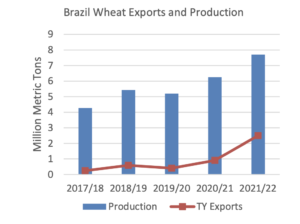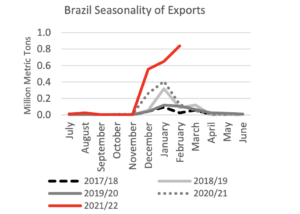Tariffs imposed by the Trump administration collected an estimated $958 million in revenue from selected agricultural inputs from February to October of 2025, according to North Dakota State University's monthly…
Brazil Wheat Exports Rise, While an Urgency to Get Ukrainian Farmers “Back in the Fields” Remains
Financial Times writers Michael Pooler, Bryan Harris and Lucinda Elliott reported yesterday that, “Alongside the sugarcane and soyabeans that sprout from his fields in the interior of São Paulo state, this year José Odilon De Lima Neto plans on sowing a different crop for the first time.
“‘There may be an investment opportunity in wheat due to complications for summer planting in Ukraine and Russia,’ said the farmer based near the city of Ribeirão Preto.
“International prices for the cereal have surged since Moscow invaded its neighbour, reflecting worries that the warring nations — which together account for about 30 per cent of all wheat trade — will struggle to deliver to the dozens of countries that rely on them for imports.”

The FT writers noted that, “Many agricultural enterprises in the region are in line for a windfall from higher commodity prices, leading some such as De Lima Neto to expand output or even switch into new areas.
But at the same time, elevated costs or looming scarcity of crucial inputs — such as fuel, fertilisers and animal feed — risk dragging on their ability to help guarantee global food security.
Pooler, Harris and Elliott pointed out that, “Although Brazil’s largely tropical climates limit wheat cultivation, it has exported more of the grain this year than in the whole of 2021. With advances in crop technology, experts believe the country — a traditional net importer of wheat — has the potential to become self-sufficient and even a net seller in the future.”

The FT article added that, “Another challenge is that this highly productive corner of the planet is still emerging from a period of severe drought that has damped growth in agricultural output and inflicted financial harm.
“For Brazil in particular one concern is fertilisers, which became more expensive before the war. The country imports 85 per cent of those chemical nutrients that it consumes, with about one-quarter from Russia.
“‘For the planting season in September, it’s going to depend a lot on the availability of fertilisers. A lack could lead to a drop in productivity,’ said [Caio Carvalho, president of the Brazilian Association of Agribusiness (Abag)]. ‘I’m very worried.'”
Meanwhile, Reuters writer Pavel Polityuk reported late last week that,
Ukraine’s state-owned railway company has temporarily restricted the transportation of some agricultural goods through border crossings to Poland and Romania, consultancy APK-Inform said on Saturday.
“It gave no reason for the restrictions.
“Ukraine, a major agricultural producer, used to export most of its goods through seaports but since Russia’s invasion has been forced to export by train via its western border.”
And Kelsey Micklas reported recently at CBS News Online that, “So far, the United Nations’ World Food Programme has been able to reach over 1 million people inside Ukraine, providing them with ready-to-eat food, bread and cash assistance.
“But [World Food Programme Executive Director David Beasley] said the war has caused a dramatic increase in the need for food aid around the world, and Ukraine — a significant producer and exporter of agricultural products such as grain, sunflower seeds and corn — could fall behind on its output because of the war. In 2021, the country exported over $27 billion in agricultural products.
“‘This is a very serious problem if we don’t get the farmers back in the fields, not just a few, but all the farmers back into the fields. So they can plant, they can put fertilizer out, they can harvest,’ Beasley said on [Face the Nation].”
“This is a very serious problem if we don’t get the farmers back into the field,” says Head of the U.N. World Food Programme David Beasley on how Ukraine’s food supply is affected by the war. pic.twitter.com/F15pE3RQjB
— Face The Nation (@FaceTheNation) April 17, 2022
“He said it is equally important to reopen ports.
“‘The Black Sea is shut down right now,’ Beasley said. ‘That’s the basis and the way by which 400 million people get their food from Ukraine right now. So that’s got to be opened up.'”





